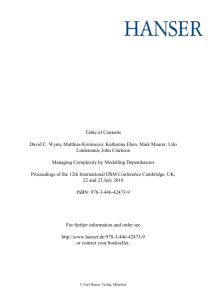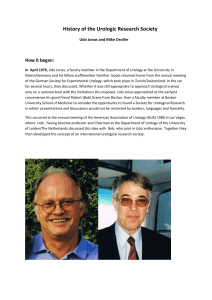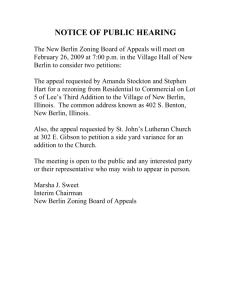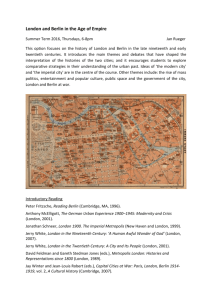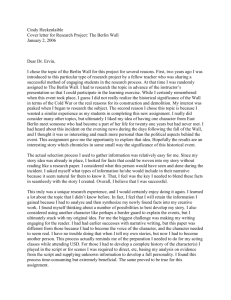Udo Lindenberg - Atlantic Affairs The Passing on of the Fire “The
advertisement
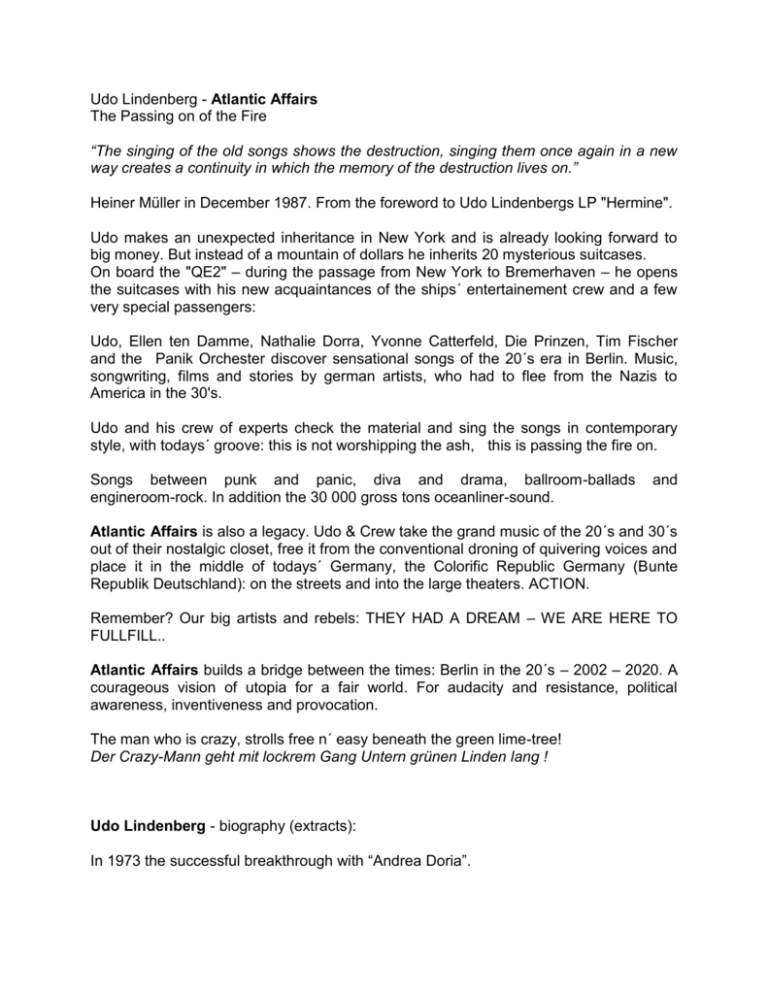
Udo Lindenberg - Atlantic Affairs The Passing on of the Fire “The singing of the old songs shows the destruction, singing them once again in a new way creates a continuity in which the memory of the destruction lives on.” Heiner Müller in December 1987. From the foreword to Udo Lindenbergs LP "Hermine". Udo makes an unexpected inheritance in New York and is already looking forward to big money. But instead of a mountain of dollars he inherits 20 mysterious suitcases. On board the "QE2" – during the passage from New York to Bremerhaven – he opens the suitcases with his new acquaintances of the ships´ entertainement crew and a few very special passengers: Udo, Ellen ten Damme, Nathalie Dorra, Yvonne Catterfeld, Die Prinzen, Tim Fischer and the Panik Orchester discover sensational songs of the 20´s era in Berlin. Music, songwriting, films and stories by german artists, who had to flee from the Nazis to America in the 30's. Udo and his crew of experts check the material and sing the songs in contemporary style, with todays´ groove: this is not worshipping the ash, this is passing the fire on. Songs between punk and panic, diva and drama, ballroom-ballads engineroom-rock. In addition the 30 000 gross tons oceanliner-sound. and Atlantic Affairs is also a legacy. Udo & Crew take the grand music of the 20´s and 30´s out of their nostalgic closet, free it from the conventional droning of quivering voices and place it in the middle of todays´ Germany, the Colorific Republic Germany (Bunte Republik Deutschland): on the streets and into the large theaters. ACTION. Remember? Our big artists and rebels: THEY HAD A DREAM – WE ARE HERE TO FULLFILL.. Atlantic Affairs builds a bridge between the times: Berlin in the 20´s – 2002 – 2020. A courageous vision of utopia for a fair world. For audacity and resistance, political awareness, inventiveness and provocation. The man who is crazy, strolls free n´ easy beneath the green lime-tree! Der Crazy-Mann geht mit lockrem Gang Untern grünen Linden lang ! Udo Lindenberg - biography (extracts): In 1973 the successful breakthrough with “Andrea Doria”. In 1979 the first big multimedia rock show " Dröhnland Smphony " directed by Peter Zadek. After his films “Panische Zeiten” 1980 and "Super" 1983 and several tours Udo Lindenberg gives his first concert in East Berlin on the 25th of October in 1983. In 1987 he tours through the USSR, with concerts in Moscow and Leningrad. Udo gives Erich Honecker, the head of state of the GDR, a leather jacket. In return Honecker gives him a shawn. In 1988 the LP "Hermine" is produced, with songs i.e. by Brecht, Eisler and Hollaender. On the 23rd of November, 1989 Udo receives the order of the Federal Republic of Germany from Berlins governing mayor Walter Momper. Later he gives it away again. In 1990: the first tour of the now former GDR. In 1996: Udo Lindenberg as a painter in various exhibitions. The first illustrated book is published. Once more he is on tour with the original Panic Orchestra. In 1997: "Belcanto" with the Babelsberg Film Orchestra. Songs by Lindenberg with grand symphonic arrangements. Tour of theaters in Germany and Switzerland. 10th of February 1998. Udo Lindenberg as a congratulator to Bertolt Brechts´ 100th birthday: concert with the Babelsberg Film Orchestra, Gisela May, Corinna Harfouch and other guests of the Berlin Ensemble. In 1999: Udo and Freundeskreis are in the charts with " You can't run away ". Exhibition " Der Pakt " in Weimar on the occasion of the 250th birthday of Goethe. Illustrated book: " Der Pakt – vom Leben gezeichnet ". 9th of November 1999: concert in front of the Brandenburger Tor in Berlin due to the 10th anniversary of the falling of the wall between east and west. In October 2000 final gala of the EXPO in Hannover: "Aus Fremden werden Freunde". After that Udo, together with other german artists, found the musician's initiative " Rock gegen rechte Gewalt (Rock against violence) ", a musical project against right-wing violence. In 2001: “Rock gegen rechte Gewalt” festival-tour with about 20.000 people in four concerts. Beginning of the project Atlantic Affairs. Art exhibition in the celebrated gallery Hans Mayer in Düsseldorf. In 2002: WDR-Rockpalast shows "Rock gegen rechte Gewalt" live from Leipzig. Permanent exhibition of drawings and pictures in the Maritim Pro Arte Hotel Berlin: "Checkpoint Udo. Seine ständige Vertretung". On the 4th of May, 2002 preview and on the 5th of May worldwide premiere of the Atlantic Affairs Show with Ellen ten Damme, Nathalie Dorra, Yvonne Catterfeld, Die Prinzen, Tim Fischer and Otto Sander in Bremerhaven. 20 suitcases come back to where they came from, where once the stars, that will never fade, had to leave their home-country. More information about the emigrant-stars: www.atlanticaffairs.de Product information CD: Producer: Udo Lindenberg/Flexibelbetriebe Studios: Kingsize Studios, Hamburg, GAGA Studio Hamburg, Studio 3-D (under the roof of HOME Studios). Guests: Yvonne Catterfeld, Nathalie Dorra, Ellen ten Damme, Die Prinzen, Tim Fischer u.a. BMG Berlin. V.Ö. 27. Mai 2002 Art Direction & Photography by Fritz Jan Thaddaeus Brinckmann & Tine Acke Hamburg. Show: Producers: Udo Lindenberg/Hermjo Klein & Bayerisches Staatsschauspiel. Consulting: Ulrich Waller Cast: Udo Lindenberg & das Panikorchester, Ben Becker, Meret Becker, Jonny Girls, Vanessa Mason, Ellen ten Damme, and more (variable cast). In cooperation with b & w, Siemens AG.. Dates: May 6th 2005, Hamburg - Staatsoper. Current dates: www.atlanticaffairs.de and www.easttoolsmedia.de. Film: Director: Hark Bohm Script: Hark Bohm based on an idea by Udo Lindenberg. Production: Cinecentrum – Deutsche Gesellschaft für Film- und Fernsehproduktion mbH In cooperation with Radio Bremen. Premiere on TV on October, 3th 2002 on ARD (Germanies public television). More detailed information about the emigrant-stars: www.atlanticaffairs.de Atlantic Affairs media office: east tools media Arno Köster Kommunikation Im Kutscherhaus Alte Strasse 4 04229 Leipzig Fon: +49 (0) 341 487 90 11 Fax: +49 (0) 341 926 01 57 e-mail: contact@easttoolsmedia.de www.easttoolsmedia.de Background - German Emigration: Further on behind the horizon Exile America - culture without home Bertolt Brecht about the expression "emigrants": I have always found the name they gave us wrong: the emigrants. That´s what you call people that leave. But we didn´t leave out of our own free will, chosing a new country. We didn´t come to another country to stay, possibly even for ever. We had to flee. We are the exiled, the banished. From 1950 until the middle of the 20th century about 7 million people left their german homeland via Bremerhaven. For the emigrants this often meant the end of many painful experiences. Predominantly driven out of their country by economic need and political prosecution. Most of the emigrants left between 1933 and 1941. In the first months and weeks after the national socialists had seized the power it was mostly their political oppponents that left Germany fearing repressive actions and pursuit. Amongst the exiled were many artists, musicians and literary figures that had been robbed of their basis of creation. Writers like Thomas und Heinrich Mann, Lion Feuchtwanger, Alfred Döblin, Anna Seghers and Joseph Roth, directors like Billy Wilder and Otto Preminger and also composers, songwriters and actors such as Hanns Eisler, Friedrich Hollaender, Anna Seghers or Marlene Dietrich. Exile – that stands for expatriation, the loss of civil rights, being homeless – Bertold Brecht wrote in his poem “Über die Bezeichnung Emigration” (about the expression emigration). For each emigrant it also meant disorientation, existential threat, lack of money, language barriers and political incabability as well as being homesick and pained by worries about the ones left behind. Escaping Hitler many artists and intellectuals ended up in New York. Amerika should become the exile without a home. The artists and radicals amongst the emigrants thought of themselves as avant-gardists, vanguard for a future where the political and cultural limits of the present would no longer count. The commoners amongst them followed their "functional" roles as doctors, lawyers or teachers. They came to America, knowing more about this country than any other emigrant ever before and with respect for the rough, modern civilization. The fates are numerous: some of the emigrants became popular in Hollywood, others just barely made it in this new world. Without the protection of an institution many had to earn their living by dirty work. Others found badly paid jobs in radio stations others became journalists. Only gradually were they able to set up a new existence as artists, however always formed by the exile from their homeland. Some celebrated huge successes in Hollywood or on Broadway. At home their art was forbidden as “degenerate”. After the war, cultural life developed with unexpected suddenness. Concerts were held, theaters reopened – the need to catch up was enormous. Work of artists that had been condemned during the 3rd Reich was back on the playlists, museums showed the works of the classic modern age. Music was the fastest to recover: just a few days after the capitulation first concerts took place. Jazz, already popular in german urban culture of the 20´s, called “niggermusic” by the Nazis, celebrated a convincing comeback. Film became the most important medium for coming to terms with the past and entertainment. The new, west-german post-war culture was essentially influenced by America. But the cultural heritage left by the emigrants remained forgotten. Also in the GDR hardly anyone treated the subject of art by the emigrated: the ash was worshipped, the memory institutionalized. Udo Lindenberg now brings a piece of german cultural history back to Germany. He builds the time-bridge from New York over Bremerhaven and Berlin, between Berlin in its´ 20´s to contemporary Berlin 2002 to the future: Berlin 2020. He passes on the fire of those emigrants, that never had the chance at the time to present their works to a large german audience. The music of the 20´s and 30´s, sung in todays´ style and groove, freed by Udo and his crew of experts from their nostalgic closet, celebrated in a big, flamboyant show and released on a new CD; up to now, no one in Germany has done this before. Not tears of sorrow but tears of joy will stream on the Columbuskaje in Bremerhaven 2002 for the return of our great artists and rebels to the streets an theaters of the Colorific Republic Germany – and the world.
